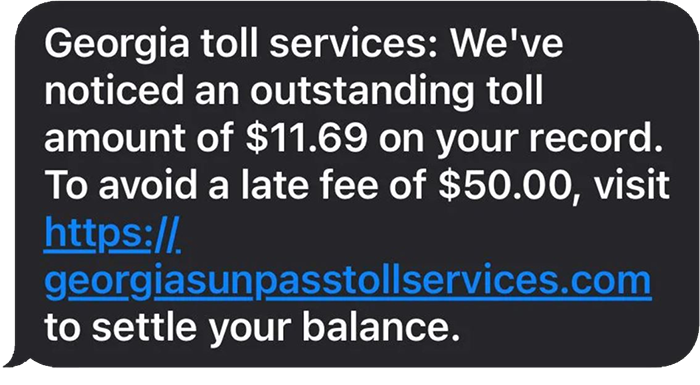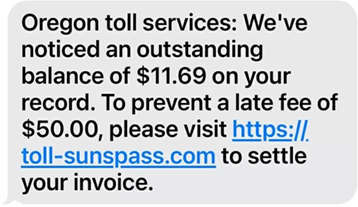Fraud Alert: Scammers Are Sending Bogus Text Messages to Collect ‘Unpaid Tolls’
Last updated June 6, 2024
If you receive a text message requesting payment for unpaid toll charges, assume it’s a scam. These fake collection notices, similar to the one below posted on Reddit, are not from a legitimate tolling agency.
Listen to audio highlights of the story below:

“Unfortunately, they are not real. These texts are designed to get you to click on a link and think you’re going to an authentic site for paying an unpaid toll,” said John Breyault, who runs the National Consumers League’s Fraud.org website. “They’re from scammers, and they are designed to get your personal information that can be used for things like identity fraud, or to get you to send them money for a toll fee you don’t actually owe.”
Following a recent spike in complaints, tolling authorities and law enforcement agencies across the country have issued alerts about this scam.
New Jersey E-ZPass warned about the “efforts to trick customers into sharing credit card numbers and other sensitive information” via text messages.
The North Carolina Turnpike Authority said the targeted phone numbers “seem to be chosen at random and are not uniquely associated with an account or usage of toll roads.”
The FBI’s Internet Crime Complaint Center told Checkbook it has received 5,800 complaints about this “smishing” attack since early March and the end of May.
The FBI defines smishing as “a social engineering attack using fake text messages to trick people into downloading malware, sharing sensitive information, or sending money to cybercriminals.” It’s a mash-up of SMS (“Short Message Service,” the formal name for texting) and phishing (bogus email that appears to come from a trusted source).
According to the FBI bulletin, the bogus texts often have a similar message, with an outstanding balance usually in the $10-$12 range.
 The malicious links provided within the text are created to impersonate various state toll services. Click one of them and you’ll be taken to a copycat website that’s made to look like a tolling authority’s home page.
The malicious links provided within the text are created to impersonate various state toll services. Click one of them and you’ll be taken to a copycat website that’s made to look like a tolling authority’s home page.
We noticed that the links in these smishing texts messages don’t always correspond to the name of the tolling authority in that specific state—a red flag. For example, a Checkbook subscriber in Oregon received this fake collection notice. The link looks like it’s to SunPass, the prepaid tolling program in Florida. And note the misspelling in the URL, an extra “s” after sun.
Right now, scammers seem focused on using text messages to lure their victims, but in some states, they’re also using email and robocalls.
The Department of Transportation in Washington state told Checkbook it had received reports from “customers and non-customers…of fraudulent robocalls, emails, and texts” that claimed to be affiliated with the state’s Good To Go! tolling system.
Protect Yourself
If you get a message that says you owe unpaid tolls, even if it looks legitimate, don’t click any links or respond in any way.
“It’s too risky,” Breyault said. “That link could take you to a spoofed website,” he cautioned.
Instead, go to the toll service’s website and check your account or use the phone number provided to contact customer service.
Red Flag: Toll collectors never notify drivers about outstanding balances or required payments via text message. If there’s a problem, notification may be done via email and payments are made by going to the official tolling website.
Report It
If you receive one of these bogus messages or have fallen victim to the hoax, report it to the FBI, Federal Trade Commission, or Fraud.org (which shares this information with hundreds of law enforcement agencies throughout North America).
If you provided the scammers with any financial information, take steps immediately to secure those accounts. Dispute any fraudulent charges made to your credit card.
You can also alert your wireless carrier by using your phone’s “report junk” button or by forwarding the message to 7726 (SPAM). This will help the phone company better detect and block fraudulent messages on its network. Then delete that message.
More Info:
From Checkbook: Protect Yourself from Identity Theft and Other Fraud
From FTC: Impersonation Scams: Not What They Used to Be
From FCC: Avoid the Temptation of Smishing Scams
Contributing editor Herb Weisbaum (“The ConsumerMan”) is an Emmy award-winning broadcaster and one of America's top consumer experts. He has been protecting consumers for more than 40 years, having covered the consumer beat for CBS News, The Today Show, and NBCNews.com. You can also find him on Facebook, Twitter, and at ConsumerMan.com.


